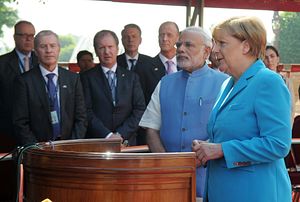A round-up of some security developments around the region that you may have missed this week:
India and Germany make moves on security cooperation. Following up on German Chancellor Angela Merkel’s October trip to India, Indian Prime Minister Narendra Modi’s government approved two agreements that were concluded during her visit. The first agreement focuses on information exchange between the two countries, including the sharing of best practices and technology. In a statement, the Indian government notes that this agreement will be “an effective tool for combating terrorism, illicit drug trafficking and preventing cross border crimes through exchange of information, knowledge, technical expertise and capacity building.” The second agreement increases cooperation between the civil aviation sectors of the two countries, improving security.
Iran deal’s implementation on track. As I noted last month, the Iran deal passed a major milestone recently when it hit “adoption day.” The Iranians have since been racing to dismantle centrifuges and implement other technical constraints on their nuclear program to comply with the July 14, 2015 Joint Comprehensive Plan of Action (JCPOA) — the “Iran deal.” According to Reuters, which saw a confidential International Atomic Energy Agency (IAEA) internal report, “Iran had moved around 4,500 centrifuges from their positions at the Fordow and Natanz enrichment sites between October 18 and November 15.” Meanwhile, Iran’s low-enriched uranium (LEU) stockpile increased by 460.2 kilograms. It stands at 8,305.6 kg and must come down to 300 kg to be in compliance with the Iran deal. Though some have taken this as a sign of the Iran deal’s ineffectiveness, it was expected that the LEU stockpile would grow as Iran dismantles centrifuges that were previously operating.
Signaling resolve in the South China Sea—poorly. Euan Graham of the Lowy Institute writes in the Financial Times that Washington’s signaling in the South China Sea recently has been muddled and confusing — a statement that should be familiar to Diplomat readers who’ve been following the debate on U.S. FONOPs in our pages lately.
Afghanistan watch: Badakhshan province. Ever since the fall of Kunduz weeks ago, it’s been readily apparent that northern Afghanistan is becoming a priority for the Taliban. The group even made the most of a recent earthquake that caused massive damage in these areas. Now, Taliban fighters have captured another district in Afghanistan’s Badakhshan province. Northern Afghanistan will be an area to watch going forward —especially given reports that Tajiks, Uzbeks, and non-Pashtuns from across the region are joining forces with the Taliban in a worrying development.
A North Korean missile test on the horizon? North Korea recently declared a “no-sail zone” off its eastern coast, raising worries that the Kim regime could be gearing up for a major missile test over the Sea of Japan. The zone is expected to stay in place until December 7.
No mercy in Pakistan for Peshawar attack perpetrators. The Taliban militants who perpetrated one of the worst-ever terrorist attacks on Pakistani soil — last December’s massacre of 140 schoolchildren at a school in Peshawar — will receive no clemency from Pakistan’s government. Four perpetrators applied for mercy, asking to avoid the death penalty, which was brought back in Pakistan after the Peshawar attack. The Pakistani president, Mamnoon Hussein, has the authority under Pakistan’s constitution to issue a pardon to any convict. Nawaz Sharif, the prime minister, asked that the president reject these petitions.
A U.S. ambassador talks about Pakistan-U.S. relations. In case you missed it, I recently spoke to Cameron Munter, who was the U.S. ambassador to Pakistan at a particularly interesting time in the bilateral relationship (during the raid on Osama bin Laden’s Abbottabad compound and the Raymond Davis affair). You can listen to our conversation on the latest episode of the podcast here at The Diplomat.

































